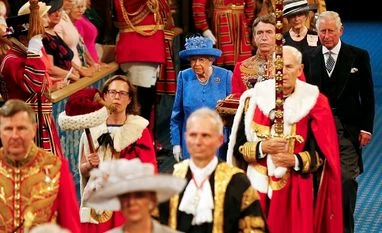Queen Elizabeth II today unveiled the government's agenda in her speech dominated by a host of proposed new laws designed to prepare the UK for a "smooth and orderly" divorce from the EU amidst the political uncertainity after Prime Minister Theresa May's poll debacle.
At a scaled-down State Opening of Parliament, the Queen's Speech, which is prepared by the government of the day and read out by the monarch, laid out the legislative priorities for parliamentary proceedings.
The scaled down version, minus the usual royal procession and pageantry, is a result of the rushed preparations following the snap general election earlier this month.
This year's speech was dominated by Brexit and will cover a two-year period instead of one to give MPs time to deliberate on laws needed to leave the European Union (EU) - irrespective of the final deal agreed with Brussels.
A host of proposed new laws designed to prepare the UK for a "smooth and orderly" departure from the EU have been announced. Of 24 bills, eight relate to Brexit and its implications for key industries.
As well as a bill to convert EU rules into UK law, there are measures on trade, customs, immigration, fisheries, agriculture, nuclear and sanctions.
As part of the dress-down version of the grand State Opening, the 91-year-old monarch arrived in a car instead of a carriage and wore a day dress instead of her traditional robes.
She was accompanied by son and heir Prince Charles rather than husband Duke of Edinburgh, after he was admitted to hospital as a "precautionary measure" last night.
There was no mention of US President Donald Trump's proposed state visit to the UK later this year, appearing to confirm suggestions it has been delayed. The main non-Brexit bills include a domestic violence and abuse bill and a data protection bill.
Meanwhile, May led Conservatives are still trying to agree terms with the Democratic Unionist Party (DUP) to secure their support for a minority government after the snap general election failed to win a majority for the ruling party.
"The election result was not the one I hoped for, but this government will respond with humility and resolve to the message the electorate sent. We will work hard every day to gain the trust and confidence of the British people, making their priorities our priorities," May said in the lead up to the Queen's Speech.
Her ministers have said some parts of the Conservative party manifesto would have to be "pruned" following the election result.
Opposition Labour party and the Liberal Democrats each plan to put forward alternative versions of the Queen's Speech.
"They have got the right to bring forward their own programme, but I don't believe, actually, that they are legitimate in the sense that they have got a mandate that they asked for," Labour's shadow chancellor Jon McDonnell said.
The Liberal Democrats said their version would call for continued membership of the EU single market and customs union after Brexit.
At a scaled-down State Opening of Parliament, the Queen's Speech, which is prepared by the government of the day and read out by the monarch, laid out the legislative priorities for parliamentary proceedings.
The scaled down version, minus the usual royal procession and pageantry, is a result of the rushed preparations following the snap general election earlier this month.
This year's speech was dominated by Brexit and will cover a two-year period instead of one to give MPs time to deliberate on laws needed to leave the European Union (EU) - irrespective of the final deal agreed with Brussels.
A host of proposed new laws designed to prepare the UK for a "smooth and orderly" departure from the EU have been announced. Of 24 bills, eight relate to Brexit and its implications for key industries.
As well as a bill to convert EU rules into UK law, there are measures on trade, customs, immigration, fisheries, agriculture, nuclear and sanctions.
Photo: AP/PTI
As part of the dress-down version of the grand State Opening, the 91-year-old monarch arrived in a car instead of a carriage and wore a day dress instead of her traditional robes.
She was accompanied by son and heir Prince Charles rather than husband Duke of Edinburgh, after he was admitted to hospital as a "precautionary measure" last night.
There was no mention of US President Donald Trump's proposed state visit to the UK later this year, appearing to confirm suggestions it has been delayed. The main non-Brexit bills include a domestic violence and abuse bill and a data protection bill.
Meanwhile, May led Conservatives are still trying to agree terms with the Democratic Unionist Party (DUP) to secure their support for a minority government after the snap general election failed to win a majority for the ruling party.
"The election result was not the one I hoped for, but this government will respond with humility and resolve to the message the electorate sent. We will work hard every day to gain the trust and confidence of the British people, making their priorities our priorities," May said in the lead up to the Queen's Speech.
Her ministers have said some parts of the Conservative party manifesto would have to be "pruned" following the election result.
Opposition Labour party and the Liberal Democrats each plan to put forward alternative versions of the Queen's Speech.
"They have got the right to bring forward their own programme, but I don't believe, actually, that they are legitimate in the sense that they have got a mandate that they asked for," Labour's shadow chancellor Jon McDonnell said.
The Liberal Democrats said their version would call for continued membership of the EU single market and customs union after Brexit.
)